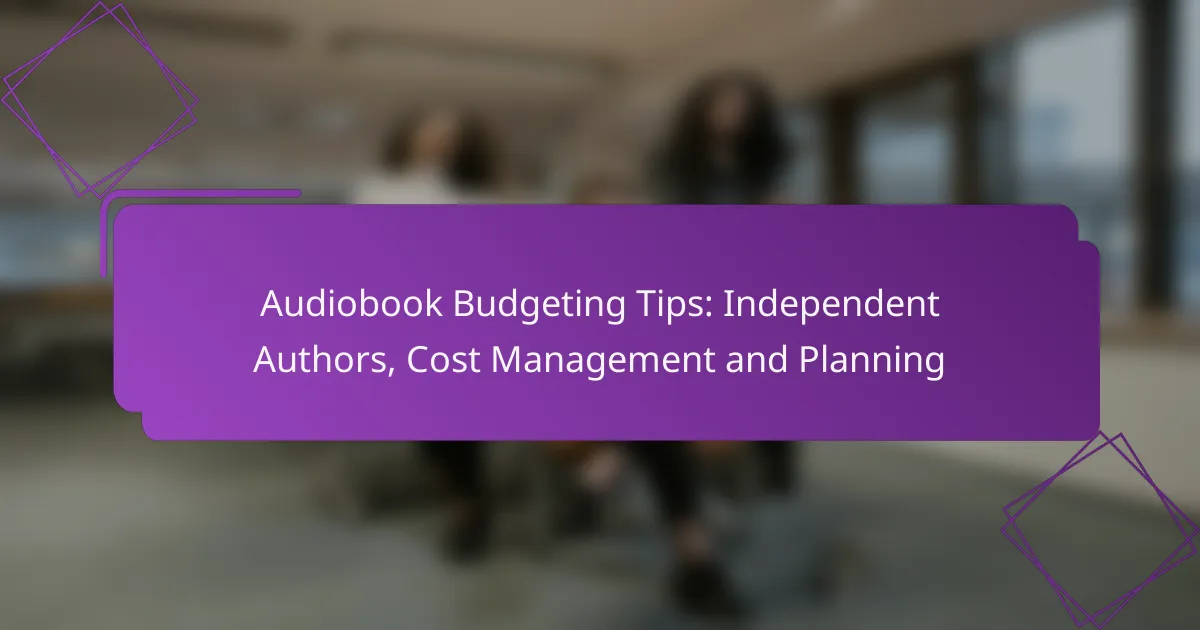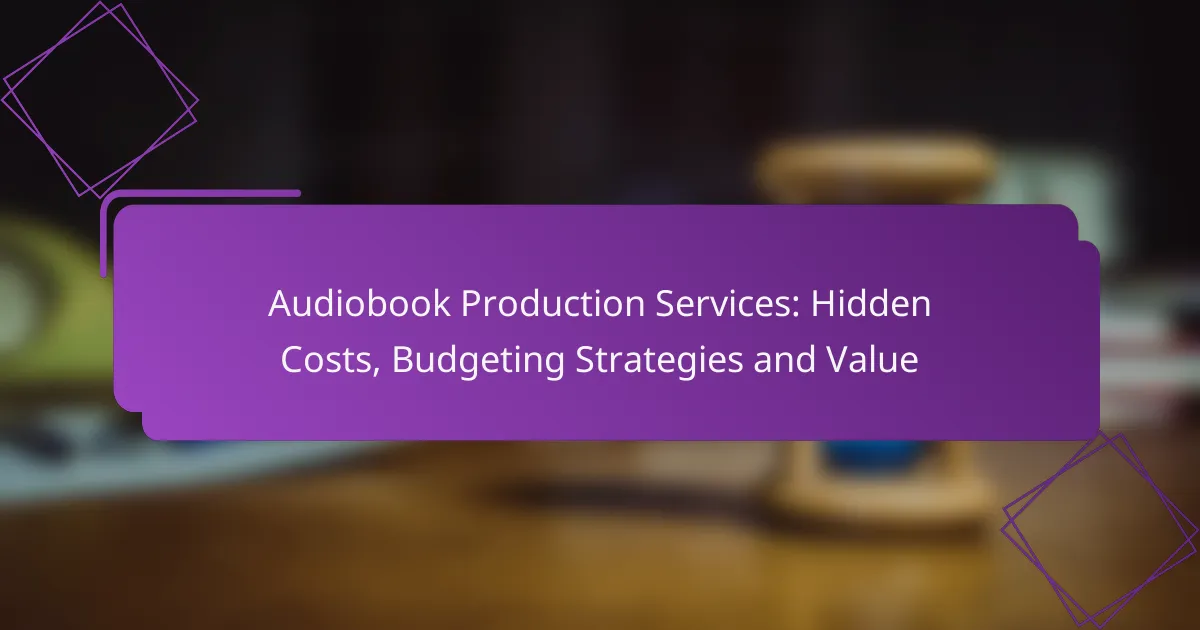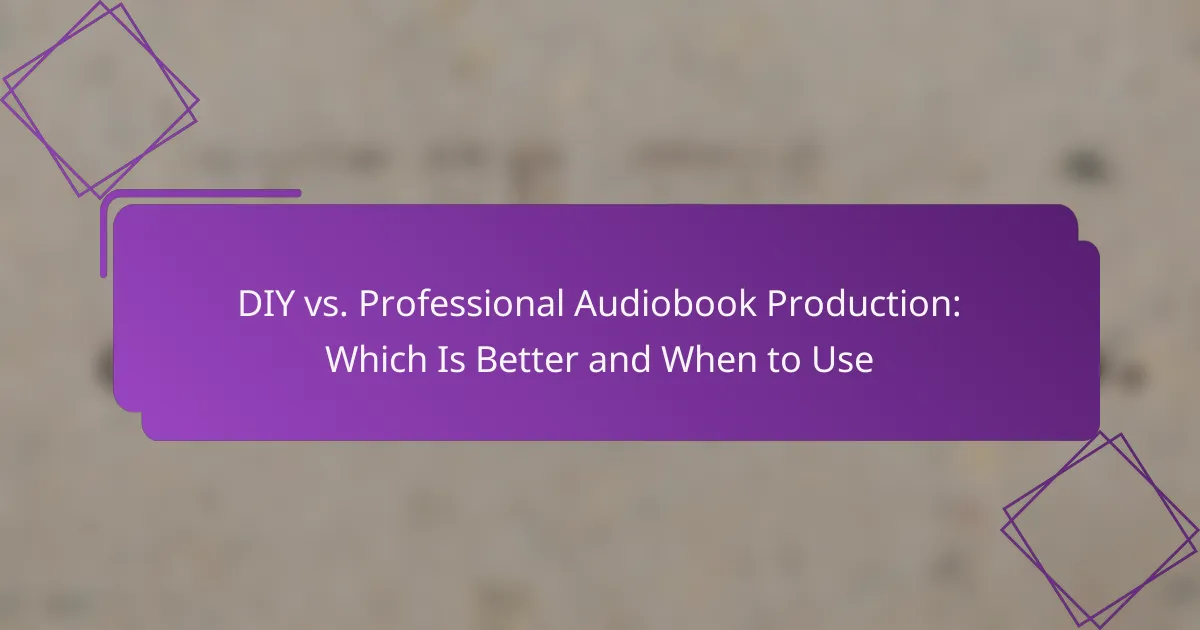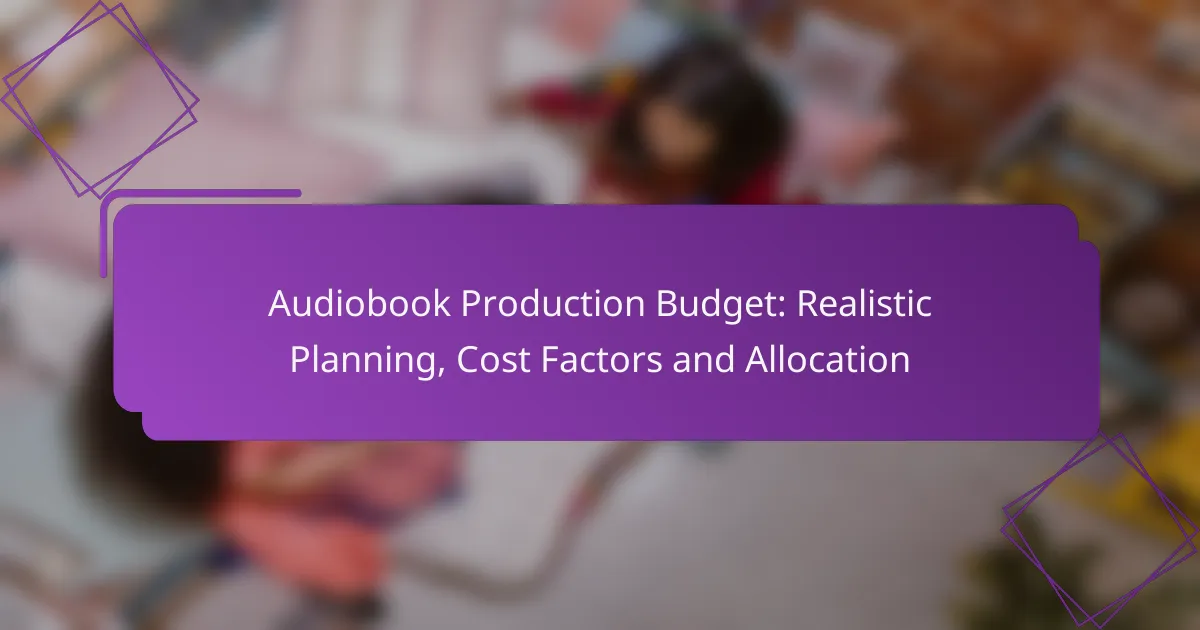Budgeting for audiobooks is essential for independent authors looking to manage production costs effectively while ensuring high-quality output. By assessing expenses such as marketing, distribution, and royalties, authors can create a structured budget that supports their creative goals. Implementing cost management strategies like outsourcing, using affordable technology, and exploring crowdfunding can further enhance financial efficiency without compromising quality.
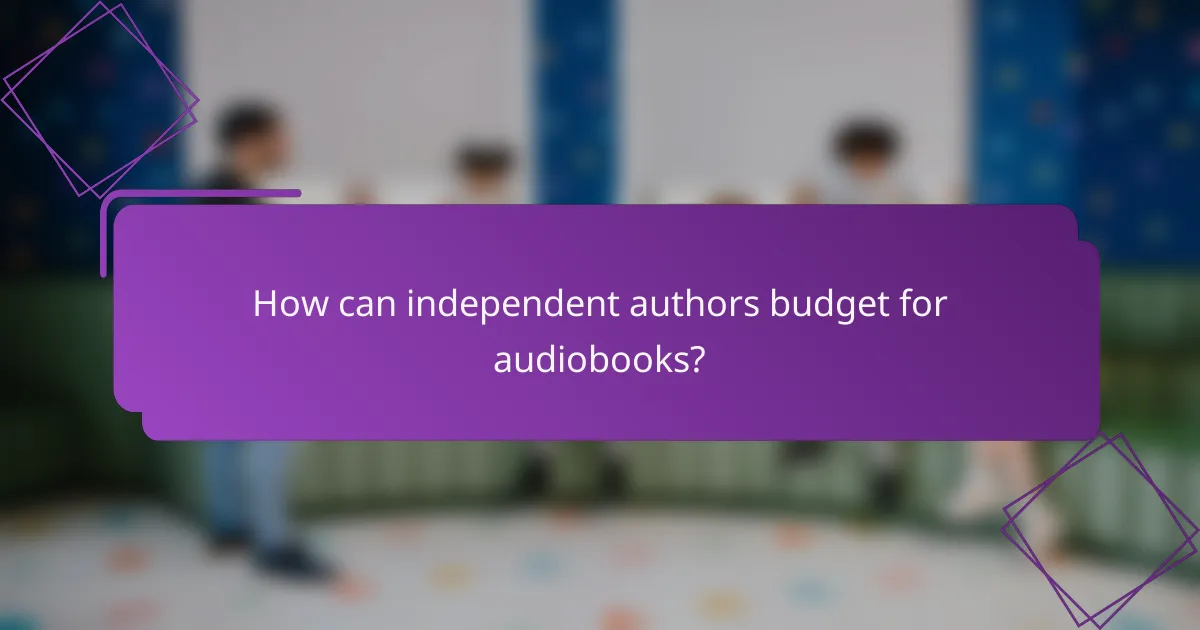
How can independent authors budget for audiobooks?
Independent authors can budget for audiobooks by carefully assessing production costs, marketing expenses, distribution fees, and royalty payments. A well-structured budget helps ensure that authors can produce high-quality audiobooks while managing their finances effectively.
Identify production costs
Production costs for audiobooks typically include expenses for narration, editing, and sound engineering. Depending on the narrator’s experience and the project’s complexity, these costs can range from a few hundred to several thousand dollars.
When budgeting, consider whether to hire a professional narrator or use a DIY approach. Professional narrators can charge anywhere from $100 to $400 per finished hour, while self-narration may save money but could impact audio quality.
Estimate marketing expenses
Marketing expenses are crucial for promoting an audiobook and can vary widely. Authors should allocate funds for social media advertising, promotional giveaways, and potential partnerships with influencers or audiobook platforms.
A reasonable marketing budget might range from 10% to 30% of the total production costs. This investment can significantly enhance visibility and sales, especially in a competitive market.
Consider distribution fees
Distribution fees are another important aspect of budgeting for audiobooks. Platforms like Audible and Findaway Voices typically take a percentage of sales, which can range from 20% to 40% depending on the distribution model chosen.
Authors should review the terms of each platform to understand the fee structure and how it impacts their overall earnings. Some platforms offer exclusive deals that may provide higher royalties but limit distribution options.
Plan for royalty payments
Royalty payments are a key consideration when budgeting for audiobooks. Authors should be aware of how royalties are calculated based on sales and distribution agreements.
Typically, authors can expect to earn between 25% and 50% of the retail price per audiobook sold. It’s essential to factor these earnings into the budget to gauge the potential return on investment.
Utilize budgeting tools
Utilizing budgeting tools can streamline the budgeting process for independent authors. Tools like spreadsheets or dedicated budgeting software can help track expenses and forecast future costs.
Consider using templates that allow for easy input of production, marketing, and distribution costs. This organized approach can help authors stay on track and make informed financial decisions throughout the audiobook production process.
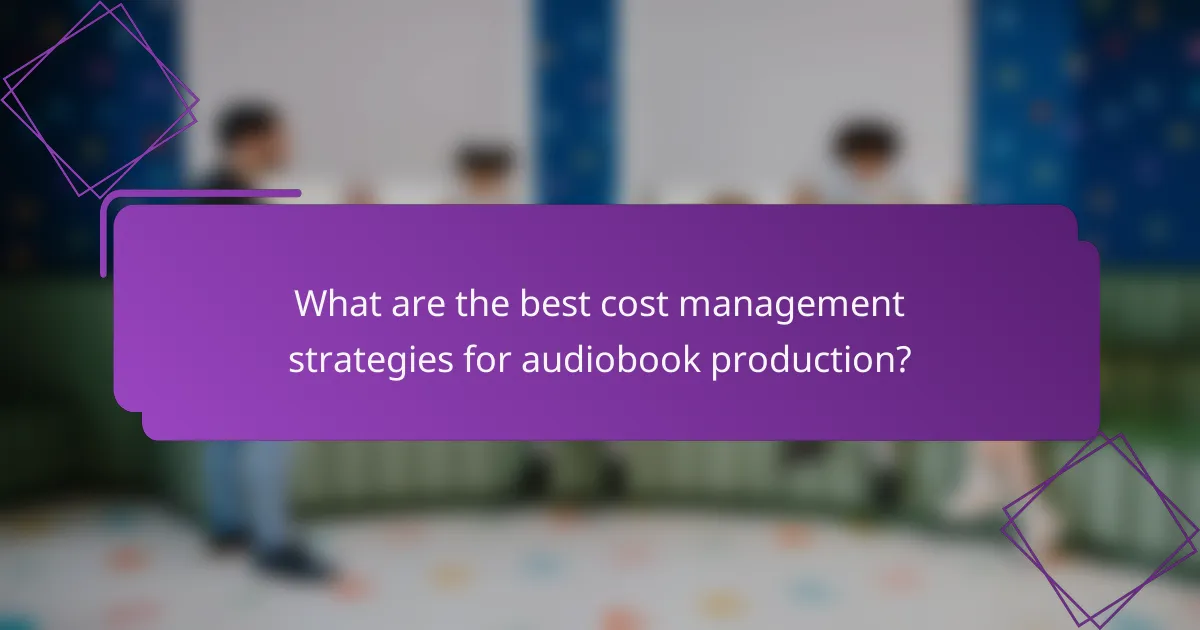
What are the best cost management strategies for audiobook production?
Effective cost management strategies for audiobook production include outsourcing to professional narrators, utilizing affordable recording software, and leveraging crowdfunding platforms. These approaches can help independent authors minimize expenses while maintaining quality.
Outsource to professional narrators
Hiring professional narrators can significantly enhance the quality of your audiobook. While this may seem like a higher upfront cost, it often leads to better sales and reviews, which can offset initial expenses. Look for narrators with experience in your genre to ensure they can convey the right tone and emotion.
Consider platforms like ACX or Voices.com, where you can find narrators at various price points. Rates can range from a few hundred to several thousand dollars, depending on the narrator’s experience and the length of your audiobook. Always request samples to gauge their suitability for your project.
Use affordable recording software
Investing in affordable recording software can help you manage production costs effectively. Programs like Audacity or Reaper offer powerful features without the high price tag. These tools allow you to record, edit, and produce your audiobook with a professional touch.
When choosing software, consider ease of use and the availability of tutorials. Many affordable options come with extensive online resources, making it easier for independent authors to learn the ropes. Additionally, using a good quality microphone can further enhance your recordings without breaking the bank.
Leverage crowdfunding platforms
Crowdfunding platforms like Kickstarter or Indiegogo can provide the financial support needed for audiobook production. By presenting your project to potential backers, you can raise funds upfront to cover costs such as narration, editing, and marketing. This approach also builds an audience before your audiobook is released.
To succeed in crowdfunding, create a compelling pitch that highlights your audiobook’s unique aspects. Offer attractive rewards for backers, such as early access or exclusive content. Setting a realistic funding goal is crucial; aim for an amount that covers essential costs while remaining achievable.
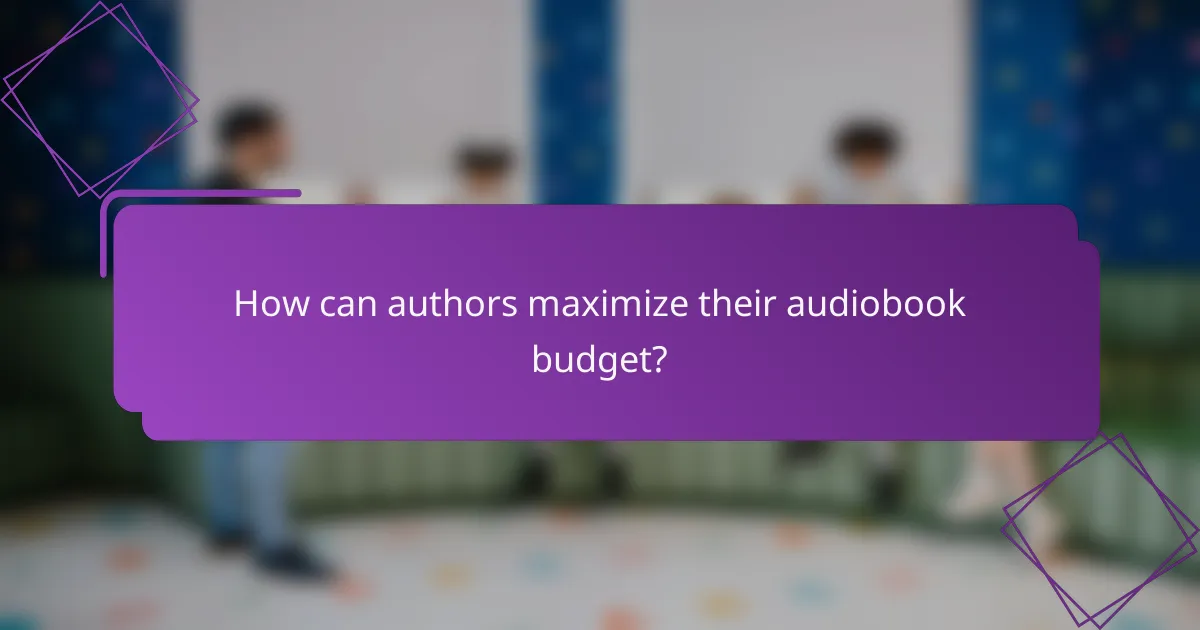
How can authors maximize their audiobook budget?
Authors can maximize their audiobook budget by strategically managing costs and leveraging available resources. This involves bundling services, negotiating with providers, and utilizing free tools to keep expenses low while maintaining quality.
Bundle services for discounts
Bundling services can significantly reduce costs for independent authors. Many audiobook production companies offer package deals that include narration, editing, and distribution, which can save authors up to 20-30% compared to purchasing each service separately.
When considering bundles, evaluate what services you truly need. For instance, if you require both narration and editing, look for a provider that offers these together at a reduced rate. This approach not only saves money but also ensures a cohesive production process.
Negotiate with service providers
Negotiation can be a powerful tool for authors looking to stretch their audiobook budget. Many service providers are open to discussing pricing, especially if you can demonstrate your potential for future projects or if you are a returning customer.
Prepare for negotiations by researching industry standards and knowing the typical costs for the services you need. Aim to establish a relationship with providers that allows for ongoing discussions about pricing and services, which can lead to better deals over time.
Utilize free resources and tools
There are numerous free resources and tools available that can help authors manage their audiobook production costs. Websites like ACX offer free guides on audiobook creation, while software like Audacity allows for free audio editing.
Additionally, consider joining online communities or forums where authors share tips and resources. These platforms can provide valuable insights into cost-effective practices and recommendations for affordable service providers.
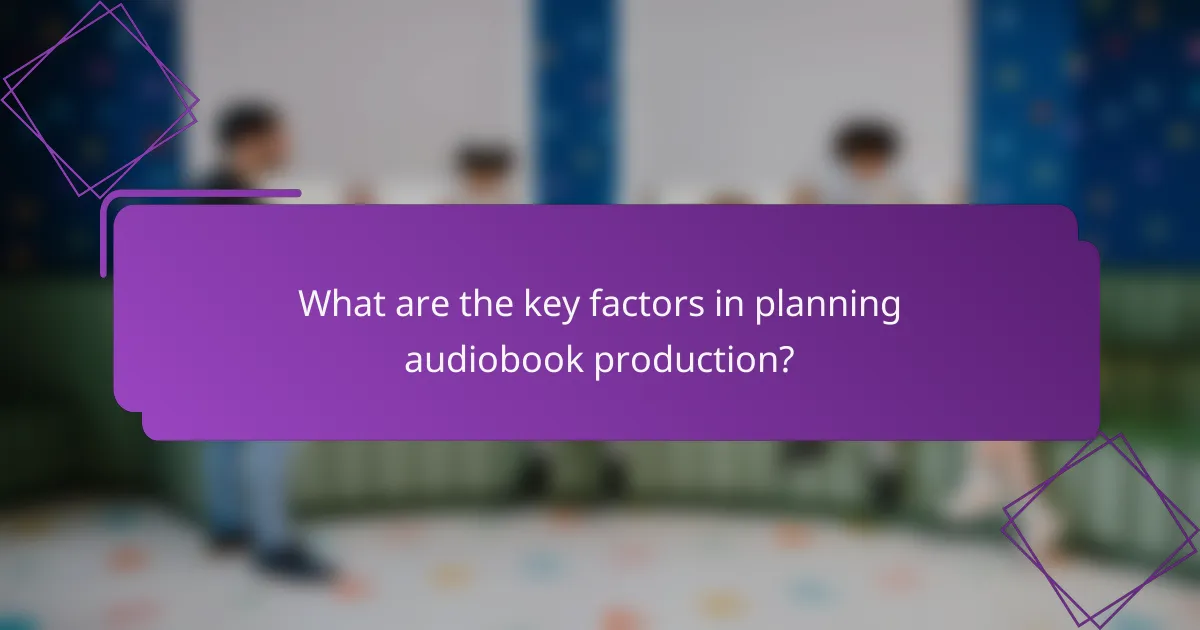
What are the key factors in planning audiobook production?
Key factors in planning audiobook production include understanding your target audience, establishing clear timelines, and outlining effective marketing strategies. These elements help ensure that the production process is efficient and that the final product reaches the intended listeners.
Define target audience
Identifying your target audience is crucial for tailoring your audiobook’s content and marketing efforts. Consider demographics such as age, gender, interests, and listening habits to create a profile of your ideal listener.
Engage with potential listeners through surveys or social media to gather insights about their preferences. This information can guide your decisions on narration style, genre, and even pricing strategies.
Set clear production timelines
Establishing a clear timeline for audiobook production helps keep the project on track and ensures timely release. Break down the process into stages, such as script preparation, recording, editing, and final review, assigning deadlines to each phase.
Consider potential delays and build in buffer time to accommodate unforeseen issues. A well-structured timeline can help manage expectations and maintain momentum throughout the production process.
Outline marketing strategies
Effective marketing strategies are essential for promoting your audiobook and reaching your target audience. Start by identifying the platforms where your audience is most active, such as social media, podcasts, or audiobook retailers.
Utilize a mix of promotional tactics, including social media campaigns, email newsletters, and partnerships with influencers or bloggers in your genre. Track the performance of your marketing efforts to refine your approach and maximize engagement.
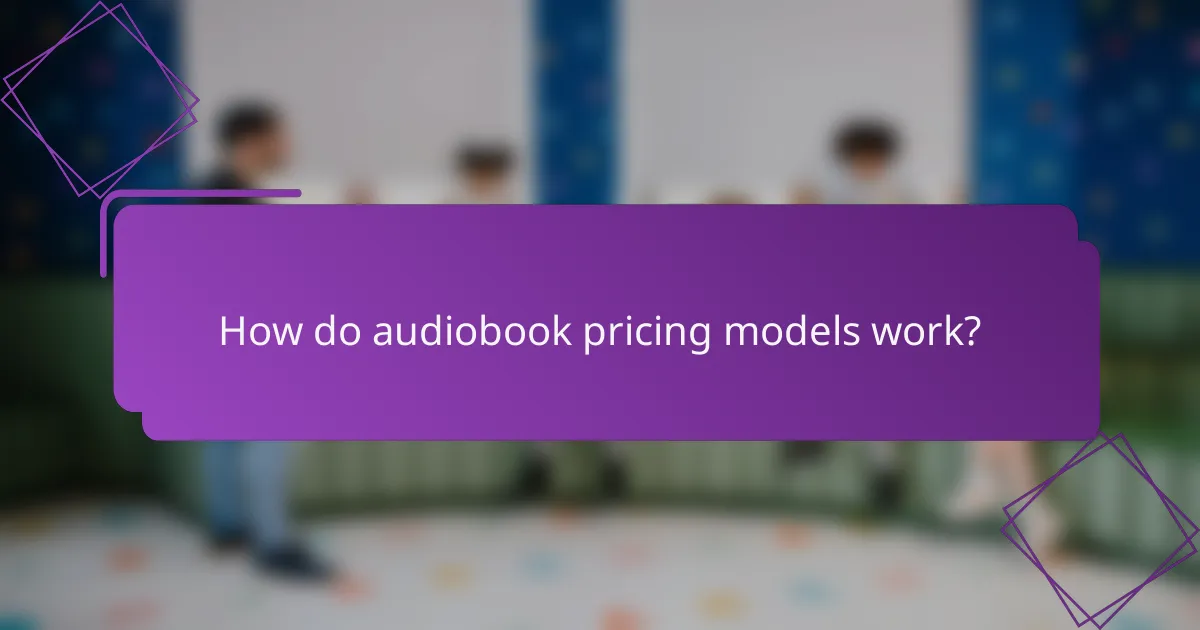
How do audiobook pricing models work?
Audiobook pricing models primarily revolve around royalty structures and distribution methods. Understanding these models helps independent authors manage costs and maximize revenue effectively.
Understand royalty structures
Royalty structures determine how much authors earn from their audiobooks. Typically, authors receive a percentage of the sales price, which can vary based on the platform used for distribution. Common royalty rates range from 25% to 40% of the retail price.
For instance, if an audiobook sells for $20 and the royalty rate is 30%, the author would earn $6 per sale. It’s crucial to compare different platforms, as some may offer higher rates but come with additional fees or lower visibility.
Authors should also consider exclusive versus non-exclusive agreements. Exclusive deals often provide higher royalties but limit distribution options, while non-exclusive agreements allow for wider reach but may result in lower earnings per sale.
